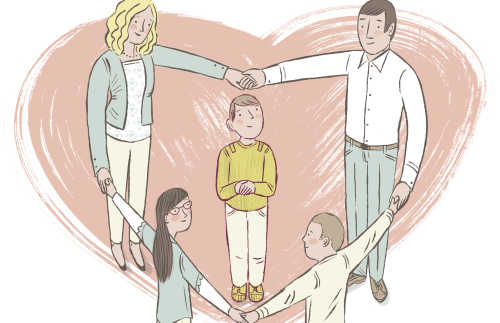By Evangelia Petsa,
Family is not a simple social institution. It is an institution that carries an anthropological, cultural, and social burden, whose value remains strong regardless of its various transformations in the course of history. Τhis value lies in the fact that it is the core of society, where human life is created and evolves within it. Family means a group of people who basically live under the same roof and are connected by biological and legal ties.
Primarily, its role is that perpetuate life, then it takes care of securing all those material means for the living and development of the young. Consequently, its contribution to the spiritual cultivation of the youth is significant. In her bosom, the child crystallizes the first language structures necessary for thinking, is fed with a variety of educational stimuli that build his relationship with knowledge, and cultivates dialogue, an important tool for intellectual development, as it promotes perceptive, memory, and abstracting skills. Equally important is the emotional coverage of young people. Within the family, the young person receives selfless love, understanding, and security, elements that guarantee his emotional maturity and enable him to cope with a multitude of difficulties, especially in the modern era.

Undoubtedly its function extends to socialization but also to the political education of the youth. And this is because it is the first form of a social group in which the individual is called to join and comply with certain rules in order to achieve orderly functioning. Gradually and with the valuable training of the parents, the young person realizes the value of cooperation, consistency, and responsibility, preparing in this way for the transition from “I” to “we” and his integration into the wider society. Kant rightly points out “the family is the eternal school and teacher of social life”. At the same time, initiation into democratic principles is achieved at an early stage within the family as it promotes in the consciousness of young people the use of dialogue as a means of resolving differences, tolerance as a non-negotiable element of harmonious coexistence, as well as equality as an acquired right of all of us.
However, the asymmetric development of material and spiritual culture, urbanization, the strengthening of individualism as well as the sharpening of the generation gap tend to question the prestige of the family institution. It is therefore the responsibility of every individual but also of all social and political actors to help support the institution so that it adequately responds to its multifaceted role.
At the first level, the responsibility falls on the family members. A basic condition for the resolution of the crisis is mutual understanding as well as a balanced division of obligations in the family. Being conscious of its supreme role, it is necessary for all its members to overcome prejudices and selfishness, to ensure free time for their gatherings and the family home must be the center of the life of its members and not a center of passers-by. At the same time, the role of the family should not be limited to the provision of material goods, but the center of gravity of the parents should be given to the humanitarian upbringing of the child. Acting as models of morals, teaching children mainly experientially and consistently with words and works in combination with providing stimuli, parents must shield the young with a strong value system capable of highlighting him as a personality in any case.

In this work of the family, it is necessary that the main bodies of treatment also help, since this crisis is not spontaneous but the family is in interaction with them. Thus, the promotion of family education at school through the cultivation of humanism, through activities that contribute to the awareness of the new generation, is deemed necessary. At the same time, the continuous cooperation of parents and teachers will contribute to the formation of a healthy personality of child. In the same direction is the support from the state, which can help the work of the family by providing benefits to working parents, by ensuring more and better childcare services. In particular, the working mother needs to be supported in order to be able to respond to her multiple roles. Finally, the state’s concern must be to strengthen the operation of counseling centers to support the family, as well as to control the contradictory messages about the role of the family as projected by the mass media.
Realizing that the family, despite the upheavals it receives in our time, is an irreplaceable institution and bond, its support is presented as imperative. Because the person who lives in a healthy family environment is a valuable element for the cohesion and progress of society. A guarantee for future generations.




